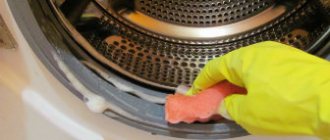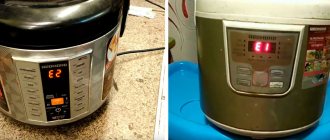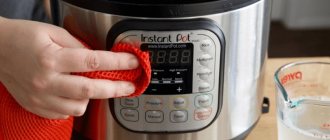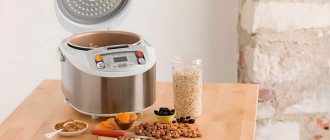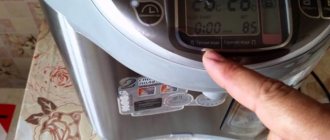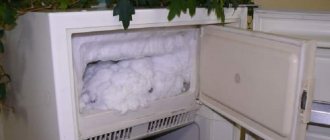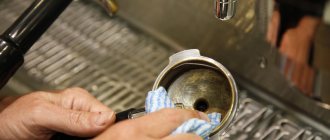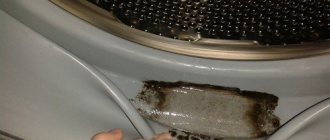A few years ago, preparing basic dishes required a lot of housewives’ time and effort. The appearance in household appliance stores of a kitchen appliance that can cook, fry, stew, bake, heat and maintain the temperature of a ready-made dish practically without human control could not go unnoticed.
And the name spoke for itself: “multi-cooker.”
A skeptical attitude quickly gave way to trust in the new device, and soon an irreplaceable assistant appeared in many apartments, significantly simplifying the procedure for preparing dishes, regardless of their degree of complexity.
On top of that, the miracle device turned out to be easy to use and affordable.
If not for one BUT. And this BUT is an unpleasant odor that could manifest itself not only after preparing a fragrant dish, but was also sharply revealed in a completely new, just purchased, appliance.
Where does the stench come from?
Let's try to figure out where the unpleasant smell in the multicooker comes from. For new devices that have not yet worked, the reason may be the use of low-quality materials in the manufacture of the device, as well as non-compliance with the temperature conditions during transportation and storage.
The manufacturer itself does not consider the smell in the new device to be a disadvantage and usually offers ways to combat it in the instructions.
At the same time, neither the brand, nor especially the price, can serve as a guarantee of the absence of odor.
The only sure way to avoid an unpleasant surprise is to sniff the multicookers that match the characteristics and price right in the store, without paying attention to the sellers and other buyers, and choose the only one, your own, without the smell of rubber and mustiness.
The appearance of a smell after cooking does not frighten you, especially since cleaning the non-stick bowl, lid, silicone seal and valve takes very little time. But sometimes regular washing is not enough, the smell remains. We have to look for radical measures to combat it, we will talk about this a little later.
Another reason why a foreign aroma may persist is insufficient care of the multicooker..
Having washed all the above parts, the housewife forgets about the plastic container for collecting excess fat and condensation, which is located on the back of the multicooker, and it reminds of itself as much as possible. Or, after washing the silicone seal, he does not wipe it dry.
Or he dries the bowl by turning it over and placing it on a flat table surface. But you never know what we might miss in the hustle and bustle of modern life! Therefore, let’s call our mistakes “insufficient care” and move on.
The smell can also arise from improper installation and improper storage of the multicooker in the kitchen.
This usually happens if the device is in a closed cabinet, not far from heating radiators, in direct sunlight, or is simply stored with the lid tightly closed.
And finally, the smell is inevitable if you keep cooked food in a slow cooker for a long time, repeatedly heating it . No comments here: the aroma of food will permeate the silicone seal, and it will take some time to get rid of it.
Prevention of unpleasant odors in a multicooker
To make the question of how to remove the smell bother you less and less, you need to follow simple care recommendations. By following them, you will reduce the chance of an unpleasant odor forming.
- After preparing dishes, do not keep them in the slow cooker for a long time; it is better to immediately transfer everything to another vessel.
- Each use should be completed with a thorough wash.
- When storing, open the lid slightly and remove the steam release valve. This will allow air to circulate and it will not stagnate.
- If a smell remains after cooking, it is better to remove it immediately. The procedure will be less problematic.
How to eliminate the stench in a new appliance?
A new multicooker, just like any new electrical appliance, when first used, in most cases has a foreign plastic smell.
- Firstly, the technical lubricant burns out.
- Secondly, the bowl itself, the seal, the valve, and other materials from which it is made smell.
This is a natural process, which in a quality item will not cause any trouble to the owner - the grease will burn naturally, and the multicooker itself, after washing with warm water and detergent and subsequent rinsing, will no longer smell like plastic and who knows what.
But this is ideal, but in practice it happens that the foreign smell is not eliminated even after the second and third wash, spoils the taste of the prepared food and makes you think about returning the purchase . True, a return is not always possible, so I suggest that you first enter into an unequal battle with an unpleasant smell and see what comes of it. Moreover, there are plenty of ways to eliminate it.
We repeatedly wash our assistant, paying special attention to the silicone seal and valve, using a soft rag or paper towel to carefully wipe other parts and the body from the inside, drying the bowl and valve separately. Store the assembled multicooker in a cool place, making sure it is not exposed to sunlight.
Do not close the lid tightly. We leave substances that absorb odors in it. Does not help? We boil water in it with the addition of various means.
How to clean the multicooker bowl?
The main rule for washing the bowl is not to use metal or hard sponges or abrasive substances, and clean very carefully.
From burnt food
If food is burnt in the bowl, never clean it with abrasives or hard brushes.
To clean the container, fill it with warm water and add 1 cap of Sypha. Leave the bowl to soak for 1-2 hours, and then remove excess dirt with a sponge.
You can also avoid burning if you follow simple recommendations:
- set the mode temperature correctly, without exceeding the maximum set by the program;
- Wash the cup after each use;
- make sure that the valves are not clogged;
- Do not fill the container with more than the permitted volume.
From fat
Remove grease stains using dishwashing detergent. Wipe the interior and exterior of the multicooker with a soapy sponge and then rinse with water. At the last stage, wipe all elements of the device dry.
From burning
Usually carbon deposits form on the bottom of the multicooker under the bowl. To get rid of burning:
- Wipe the bottom with a damp cloth.
- Cover the surface with baking soda.
- Leave the substance for 15 minutes.
- Remove excess soda and carbon deposits with a damp soft cloth, so as not to scratch the coating.
- Wipe the bottom with a dry cloth.
From scale
If scale appears on the surface of the bowl, citric acid or vinegar will help. It is important to start the fight at the first appearance of plaque, and not wait until the scale completely covers the bowl.
Pour 1 liter of water into a container and add 1 tbsp. a spoonful of vinegar or citric acid. Turn on the steam mode for 10-15 minutes. Then drain the water and wipe the bowl with a dry cloth.
Wipe the internal and external parts of the multicooker on which plaque has formed with a soda solution. Leave the mixture on the surface for 10–15 minutes and then wipe with a damp cloth.
From mold
If, after washing, the bowl and lid of the multicooker were not sufficiently dried, mold fungi may appear in areas of excess moisture. To remove dirt and disinfect the surface, use regular soda. For this:
- Fill the bowl with water to the maximum level.
- Dissolve a small amount of baking soda in water.
- Set the soup mode or any other program so that the water boils.
- Wait until the appliance has finished operating and rinse the bowl.
- Wipe all surfaces with a dry cloth.
How to clean after cooked foods?
It is necessary to care for the multicooker after each use..
Wash, dry, do not be lazy to disassemble the valve and wipe the non-removable parts dry. And don’t forget - any disaster is easier to prevent. Therefore, you should think carefully about whether you should cook strong and persistently smelling foods in a slow cooker, or take your favorite saucepan to cook fish soup.
If the multicooker is used quite actively, you need to purchase another bowl, as well as professional cleaning products (Bright MultiCare, Top House).
Do you trust folk recipes?
Not really
Cleaning products
All of the following means and methods are suitable for eliminating odors in both a new and working multicooker. The only thing you need to pay attention to is the concentration of the solutions used .
Although multicooker parts are designed to withstand high temperatures and long-term use, it is unlikely that a high concentration of, for example, vinegar essence will benefit them.
Lemon
This method is recommended by the manufacturer and is outlined in the instructions for many models of multicookers.
- Pour about one-third of the water into the bowl.
- Add chopped lemon or a little citric acid there.
- Turn on the “steam” mode for 15-20 minutes.
- Without opening the lid, wait until the water cools down and repeat heating.
- Again we wait until the water becomes warm, after which we wash the bowl, the multicooker lid, the silicone seal and the removable valve with the same water.
- Then rinse with clean water, gently wipe with a soft rag or paper towel and leave the multicooker with the lid open until completely dry.
There is another, more labor-intensive way to eliminate odor using lemon. To do this, you need to cut the lemon and thoroughly wipe all surfaces of the multicooker with half, except the heating elements .
Citric acid can also help in cleaning the microwave from carbon deposits and grease.
Vinegar
Vinegar is a universal folk remedy for eliminating any odors. Works great. We wash all the parts of the multicooker with a weak solution of vinegar or acetic acid in warm water. Make sure that the sponge or rag is soft and does not scratch the surface . Next, as usual, rinse, wipe, and dry.
Most likely, after washing, a faint smell of vinegar will remain, but it will dissipate within a few hours.
You can read about how to use vinegar to clean the grease inside an electric oven here.
Coffee
Another universal odor absorber. It’s not for nothing that its grains can be found in perfume departments of stores, where they successfully combat mixed odors of cosmetics.
You shouldn’t expect an immediate effect from using coffee, but if you pour a few beans onto a plate and place it in the multicooker bowl overnight, the smell from the previously prepared dish will disappear without a trace.
Welding
You can try to eliminate the unpleasant odor using tea leaves . To do this, after preparing food, the multicooker bowl needs to be rinsed and then treated with dried tea leaves.
This method has its pitfalls: firstly, the bowl may change its color due to interaction with the tea leaves, and, secondly, grains of tea may fall to the bottom of the multicooker body, and removing them from there will be inconvenient.
Salt or soda
They can be used separately or together. But in the case of a multicooker, a soda solution is more versatile, suitable for both washing the device and boiling. Let's look at how this works.
To wash the multicooker, dilute baking soda with heated water and make sure that the substance is completely dissolved . Then again, I wash everything that can be washed, rinse, and dry.
The soda solution is not toxic, it will not cause unpleasant sensations to your hands, does not have any foreign odor, and can cope not only with residual aroma, but also with grease stains.
Baking soda is also great for other purposes, for example, using baking soda you can quickly clean grease from your microwave.
The same solution can be brought to a boil, provided that there is enough water in the multicooker and it does not evaporate. Otherwise, soda crystals will remain in the multicooker, and you will have to remove them. Sometimes soda is mixed with table salt, approximately 1:1, and used for washing dishes . Baking soda can also be used to clean grease from a gas stove.
Celery or ginger root
Removing unpleasant odors is also possible with the help of celery and ginger.
These plants themselves have a sharp, fresh smell with light notes of citrus, which has long become familiar to us.
Therefore, if you have celery root or ginger in the refrigerator, you can use them to boil in a slow cooker to eliminate extraneous odors.
This is quite simple to do: chop the root, add enough water (about one third of the multicooker bowl) and boil for about 30 minutes. During this time, the water should not boil away.
To enhance the effect, you can add a few drops of vinegar to the celery, and a pinch of black pepper to the ginger . Leave the solution in the closed multicooker until it cools.
Boiling
Boiling is one of the best ways to combat odors. The result will be even if you use only clean water. In some cases, it is enough to boil it once, in others it will require repeated processing.
Adding lemon, soda, salt, and vinegar to the water will only enhance the expected effect. But if lemon, soda and salt do not give off any strong odors when boiling, then you need to be extremely careful when using vinegar.
Eliminating odor from a new multicooker
This technique is found in most kitchens around the world, so the problem of removing unpleasant odors from it is quite acute. To prepare dishes, just load the necessary products and select a mode, then everything will happen automatically. Let's figure out how to remove the unpleasant smell from the multicooker.
Bide the time
If you pay attention to the instructions, then, among other things, it says that after purchase there may be a slight smell of plastic, or as it is also called newness. This is quite natural and should be so; this indicates that the device is completely new and has not yet been used.
The solution to the problem is very simple, just wait a while for the aroma to disappear on its own. You can now use the multicooker; this will not affect the taste of the food in any way and the smell will disappear after 3 days.
Boiling
But not everyone agrees to put up with this phenomenon. Some people need to get rid of the smell of newness urgently or are simply irritated by it. To do this, boil plain water in a multi-cooking bowl. Sometimes the procedure needs to be carried out several times. This will remove the unpleasant odor completely.
Fight old odors with lemon
To remove the smell from a multicooker that has been in use for some time, you will need something stronger than ordinary water. Spices from cooked dishes often stick firmly to the walls of the appliance and then change the taste of dishes in the future. Often even cleaning with chemicals does not bring the desired effect. In this case, you can use the traditional method and resort to the help of lemon.
In order to clean out all the excess odor, we need a steamer function. Pour a liter of water into the bowl and add ripe lemon cut into slices. We set it to the above-mentioned mode for 30 minutes. When the work is finished, wash out the contents of the bowl and enjoy almost perfect cleanliness. There may be a slight pleasant aroma of lemon freshness that will quickly dissipate.
Lemon acid
Oddly enough, citric acid used for cooking can replace traditional citrus fruit. The procedure is identical to the previous method, only instead of chopped lemon, add half a teaspoon of acid. After using the steamer, rinse the bowl and you're done.
Coffee
Using coffee will take a little longer, but less effort. Suitable if you don’t need a multicooker in the next 24 hours. To remove the smell, just leave a saucer of ground coffee in the bowl for a day. Ground coffee beans will absorb all the aromas and clean your equipment without any extra effort.
Vinegar against odors
We remove the smell in the multicooker using table vinegar (9%). As before, we need a liter of water, one tablespoon of vinegar is diluted in it. Pour into the bowl and turn on the steamer for half an hour. We rinse the valve and bowl with clean water and wipe dry. The method helps to easily cope with even stagnant odors.
Prevention
How to prevent unpleasant odors from appearing in a multicooker? The rules are quite simple :
- after each use, the multicooker should be thoroughly washed, especially contaminated areas (valve, container for collecting fat and condensation), to avoid a musty smell, wipe the seal and the inside of the body, dry thoroughly;
- after preparing strong-smelling dishes, leave substances that absorb odors (coffee, soda, activated carbon, dry citrus peels) in the multicooker bowl;
- store in a dry, ventilated place, avoiding external heating of the device;
- do not close the lid tightly;
- do not allow food particles or fat to come into contact with the heating elements;
- Avoid cooking strong-smelling dishes in a slow cooker.
Traditional methods
The easiest way to quickly get rid of the smell in a multicooker is to boil the bowl , filling it with plain water. If necessary, the procedure is carried out several times. If the stench does not disappear, the multicooker can be washed using available substances. This can be salt, vinegar, citric acid and much more. They wash away greasy stains no worse than household chemicals, and do not harm the outer coating:
- Laundry soap . This product efficiently removes any dirt, fat deposits and removes unpleasant odors. Lather the sponge with soap until foam forms and wipe all greasy marks with it, both outside and inside. The foam should remain on the surface for 20 minutes, then it is washed off with water. If you drop 3-5 drops of liquid detergent into the soap solution, the treatment effect will be better. The lid must be cleaned with the hard side of the sponge. At the end of the procedure, wipe the part with a dry cloth.
- Lemon water . Citric acid or lemon juice will help to clean the inside of the bowl from old odorous contaminants. One fruit is squeezed out and dissolved in a liter of water. The prepared solution is poured into a container and the steam cooking program is turned on. After 10-15 minutes, the dirt will soften and can be easily washed off. Moisten a soft sponge or napkin in lemon solution and wipe the lid.
- Table vinegar . A vinegar solution will help get rid of the unpleasant odor in the multicooker. For 1 l. 15 ml of water will be needed. Fill the bowl contaminated with greasy stains with 0.2 liters of water, add 5-7 ml of vinegar, start the steaming mode, having previously closed the lid tightly. After 10 minutes, wipe the device with a damp cloth and dry.
- Soda . This substance is an excellent adsorbent and has antiseptic properties. Soda - 5 tablespoons dissolved in 50 ml of water. A sponge is moistened in the prepared soda slurry and the stains are wiped with it. The substance is washed off with warm water after 15 minutes, then the entire device is wiped with a dry cloth.
Cleaning products for Teflon-coated bowls must be selected carefully. For example, you cannot use soda, as its particles can scratch the product. The same applies to ceramic containers.


